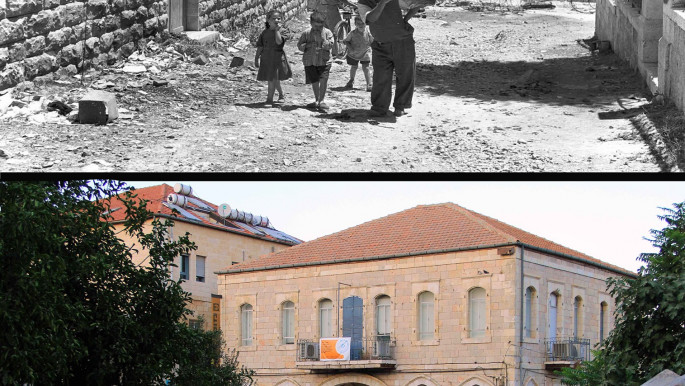'We were and are still here': A visual history of Palestine's lost past
Forbidden from travelling there himself under Israeli law, Tarek, now 34, took pleasure in helping with his friend's request.
As time went on, Tarek began receiving more and more requests from Palestinians in the diaspora to photograph the villages, and even houses, their relatives were forced to leave.
Eventually, he decided to launch the 'We Were and We Are Still Here' initiative, a visual documentation project sharing personal Palestinian histories.
On the Facebook and Instagram pages he set up, Tarek began receiving requests from the grandchildren of those who were forced to flee Palestine asking to locate their family homes.
He normally asks for pictures, maps or detailed descriptions of the properties so he can locate them - that is, if they have not already been destroyed.
| Instagram Post |
"The more requests I get, and stories I publish, the more it disproves the Israeli narrative that Palestine was an inhabited land when it was occupied in 1948. This is my goal, actually, to disprove this narrative," Tarek told The New Arab.
The project expanded as Palestinians in the diaspora with dual nationalities began travelling to Israel to see the villages and homes of their ancestors, in cooperation with Tarek, who made all of the logistical arrangements and later shared their stories online.
"I do this not only because I know how it feels to be denied access to your original home, but also because this is another way to fight against an occupier who wants to bury your identity and history," Tarek says.
As a Palestinian from Jerusalem, Tarek has Jordanian travel documents and an Israeli residence permit, but not any official Palestinian papers. "This is what makes me more attached to Palestine, Israel is trying to make me feel disconnected with my home country, but I do everything I can to feel more connected."
'Acre's Bride' was one of the project's stories that went viral, recounting the family history of a Canadian-Palestinian woman called Zaina who made it to Palestine for the first time to look for her grandfather's former house.
Tarek took the newly married Zaina and started the probing journey, later finding the abandoned home, which was still intact, and organising a traditional Palestinian-style zaffeh wedding procession which was attended by her family's old neighbours.
More than 750,000 Palestinians were expelled from their villages during the 1948 Nakba, or catastrophe, in 1948, while hundreds of Palestinian villages were destroyed.
 |
The more requests I get, and stories I publish, the more it disproves the Israeli narrative that Palestine was an inhabited land |  |
The descendants of those who fled to neighbouring Middle Eastern countries, Europe, and the Americas now number around seven million, but have been forbidden by Israel from permanently returning. Those who have foreign passports are able to visit, but it is a process fraught with difficulty.
2020 has been a difficult year for Palestinians. In January, US President Donald Trump presented his long-awaited Middle East peace plan, which effectively greenlighted the annexation of the Palestinian Jordan Valley and East Jerusalem.
 |
|
| Houses being looted in the Palestinian area of Musrara in Jerusalem, 1948. |
More recently, a series of normalisation deals have been signed between Israel, Bahrain, the UAE and Sudan, further damaging the Palestinian cause.
In this environment, the work Tarek does in documenting Palestinian history is of increasing importance. He says the two-minute videos he produces often take up to a month of intensive research and are completely independent and voluntary, although friends pitch in to help with filming and editing.
Asked if confrontations occur between the Palestinian descendants of former house owners and their current Israeli occupants, Tarek says they happen, but it is not one of his goals.
"I happened to tell some of these residents that I have the former owners of the house with me, some were okay with it, others went angry and very defensive."
Tarek recalls one encounter in which an Israeli resident told the Palestinian visitor that he could come and visit the house anytime he wants. "Another said that he has the house because his country won a war, and no one should be sad if his country wins the war," Tarek said.
Recently, Tarek decided to elevate the project and has begun training Palestinians who can travel in Israel to work with him. "Sometimes I get requests while I'm out of Palestine; this is why it was important to have a team with me to make this project continue."
While never expecting his efforts to become this popular, he is overjoyed that his project is raising more awareness about Palestine and Palestinian refugees.
"I'm very happy and content with the work I do. I'm determined to keep doing it until Palestine is finally liberated."
Abeer Ayyoub is a freelance journalist based in Amman.
Follow her on Twitter: @abeerayyoub





 Follow the Middle East's top stories in English at The New Arab on Google News
Follow the Middle East's top stories in English at The New Arab on Google News


